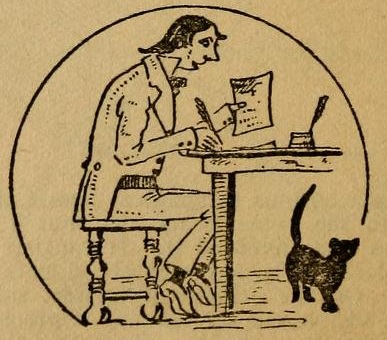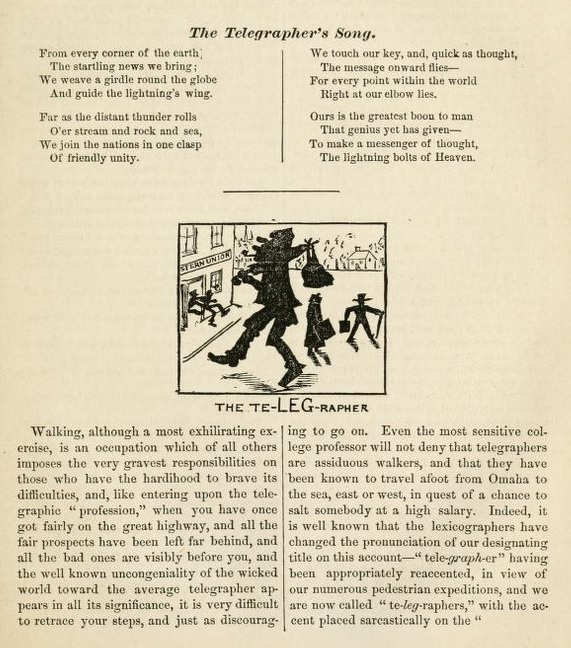TECHNICAL NOTE: The great majority of the links below are to
scanned antique books at the Internet Archive, most of them
anthologies. Poems frequently run for several pages; when coming
to the apparent end of a poem, turn the page to make sure!
Comic poem from the dawn of the age of biochemistry. Signed "H.W."
The Antiseptic Pledge
An Appeal for Air
Modern readers, unlike Nineteenth Century ones, would probably find this
poem funnier if it weren't written in rustic dialect.
Applied Mathematics
An arithmetic joke. Would be funnier if it scanned.
The Chemist to His Love
A Darwinian Ballad
The Dinosaur
To a skeleton in a museum. (From Punch; signed "D. M. S.")
The Little Star
"Scintillate, scintillate, globule orific."
The March of Science, in Which are Noticed the
Principal Discoveries and Improvements of Modern Times. (1846)
Probably by
Charles Mead, an American school-teacher and extreme
technological optimist.
The Microbes
The Music of the Spheres: Typical example
of pro-science Romantic verse, from
Charles Dickens's magazine All The Year
Round [1868 August 22].
Ozone.
Still accented on the last syllable in Nineteenth Century English.
Some Psalm
Zoölogy
Anonymous
Cambridge Poets:
Anonymous
Limericks:
Anonymous
Telegraphers' Poems: The telegraph network was
the Nineteenth Century internet. Telegraph operators, called
"plugs", were young,
highly intelligent, generally lower-class, always ambitious. As they
drifted from station to station
along the lines in search of work, they developed an
irreverent "hacker" subculture, complete with its own
folk-literature
(usually humourous or sentimental, sometimes racy, and often containing
ethnic stereotypes, particularly of the Irish).
-
To Annie Ellsworth who sent the first public message on
Morse's telegraph.
-
The Carnival of Oshkosh
Parody of a Shakespearian tragedy.
-
Downey's Lament
Song of an Irish technician.
-
Misplaced Affection
About the (nowadays) well-known
problems which may arise in online relationships.
-
Out of Adjustment
A brief romantic encounter between operators takes an
unfortunate turn, but all's well that ends well:
"You adjusted my relay, assuaging my tears // And I
in return have reciprocated."
-
En Rapport
Male and female operators flirting from different continents.
-
The Song of the Plug
Operators introduce the human factor that
frustrates the system designers: "Breaking on duplex and single strings too; //
On all kinds considered a 'bug'."
-
The Song of the Wire
transmitting good and bad tidings alike.
-
By Telegraph
Another meditation on the system's indifference to the
joyous or tragic nature of the information transmitted.
-
The Telegrapher's Song
"Every point within the world // Right at our elbow lies."
-
The Telephone
The next wave of technology, described in mock-Irish dialect.
Abbey, Henry:
Zoölogist (or at least cryptozoölogist) versus Shelob,
like a Ryder
Haggard story in high-quality blank verse.
Science and the Soul
Despite the regretably didactic title, a
very interesting dream-poem about neuroscience,
evolution, and other topics, not
really anti-science but clearly sympathetic to the claim that science will
never fathom life.
Abbott, H. H.:
Abercrombie, Lascelles:
Ade, George:
-
The Microbe's Serenade Uses the jargon of biology for humourous effect,
but without much evidence of understanding the science.
Allingham, William:
Which might have inhabitants: "Heed they at all, for their
part, our little
one-moon'd planet?"
Anderson, J. Redwood:
Arnold, Edwin:
Arnold, Matthew:
-
Dover Beach: Perhaps the most famous of all Victorian
crisis-of-doubt poems.
(performed by Hernan Berisso et al.)
In Harmony with Nature
Who would want to be?
Urania
... has not yet found a man worthy of her.
Atwell, Roy:


